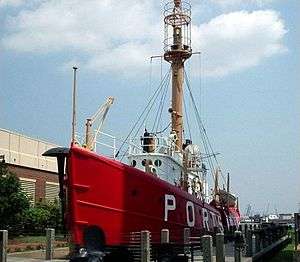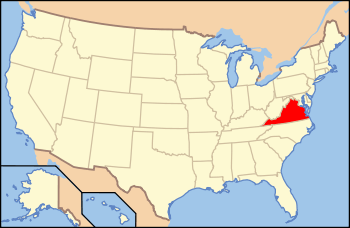United States lightship Portsmouth (LV-101)
 | |
| History | |
|---|---|
| Name: | Portsmouth |
| Builder: | Pusey & Jones |
| Laid down: | 1915 |
| Launched: | 12 January 1916[1] |
| Acquired: | 2 September 1916 |
| Decommissioned: | 23 March 1964 |
| In service: | 1916 |
| Out of service: | 1963 |
| Identification: |
|
| Status: | Museum ship |
| General characteristics | |
| Type: | Lightship |
| Displacement: | 360 long tons (366 t) |
| Length: | 101 ft 10 in (31.04 m) |
| Beam: | 25 ft (7.6 m) |
| Draft: | 11 ft 4 in (3.45 m) |
| Propulsion: | Meitz & Weiss 4-cylinder kerosene engine, 200 hp (149 kW) |
| Speed: | 8 knots (15 km/h; 9.2 mph) |
| Armament: | None |
|
Lightship No. 101, Portsmouth | |
 | |
| Location | Portsmouth, Virginia |
| Coordinates | 36°50′19″N 76°17′55″W / 36.83861°N 76.29861°WCoordinates: 36°50′19″N 76°17′55″W / 36.83861°N 76.29861°W |
| Built | 1916 |
| Architect | Pusey & Jones Lightship; US Lighthouse Establishment |
| NRHP Reference # | 89001080[2] |
| VLR # | 124-0102 |
| Significant dates | |
| Added to NRHP | 5 May 1989 |
| Designated NHL | 5 May 1989[3] |
| Designated VLR | March 19, 1997[4] |
United States Lightship 101, known as Portsmouth, was first stationed at Cape Charles, Virginia. Today she is at the Portsmouth Naval Shipyard Museum in Portsmouth, Virginia. Portsmouth never had a lightship station, however when the vessel was dry docked there as a museum, she took on the pseudo-name, Portsmouth. A National Historic Landmark, she is one of a small number of surviving lightships.[5]
History
Lightship Portsmouth (LV-101) was built in 1915 by Pusey & Jones. She first served as Charles in the Chesapeake Bay outside Cape Charles, Virginia from 1916 until 1924. After that assignment Portsmouth served just over a year as the relief ship for other lightships in her district. She was then moved to Overfalls, Delaware, where she was stationed from 1926 to 1951 as Overfalls. In 1939 when the United States Lighthouse Service was absorbed into the United States Coast Guard she was reclassified WAL-524, but still kept a station name on her hull. During World War II the vessel was not armed, however many other lightships were. In 1951 LV-101/WAL 524 was reassigned to Stonehorse Shoal, Massachusetts, where she served until decommissioned in 1963. The lightship then sat in harbor at Portland, Maine, until her fate had been decided.
On 3 September 1964 LV-101 was donated to the City of Portsmouth, Virginia, to become a part of the Portsmouth Naval Shipyard Museum. Portsmouth was dry docked at the London Pier in Portsmouth. Although she was never stationed there, she has taken on the city's name. In 1989, Portsmouth was designated a National Historic Landmark and is open for visitation.
Name and station assignments
- Charles, Cape Charles, Virginia (1916–1924)
- Relief, Relief 5th District (1925–1926)
- Overfalls, Overfalls, Delaware (1926–1951)
- Stonehorse Shoal, Stonehorse Shoal, Massachusetts (1951–1963)
Other lightships of Chesapeake Bay
See also
- List of National Historic Landmarks in Virginia
- National Register of Historic Places listings in Portsmouth, Virginia
References
- ↑ "Vessel Designation: LV 101 / WAL 524". U.S. Coast Guard Lightships & Those of the U.S. Lighthouse Service. United States Coast Guard. Retrieved 2009-12-16.
- ↑ National Park Service (2008-04-15). "National Register Information System". National Register of Historic Places. National Park Service.
- ↑ "Lightship No. 101 "Portsmouth"". National Historic Landmark summary listing. National Park Service. Retrieved 2008-06-26.
- ↑ "Virginia Landmarks Register". Virginia Department of Historic Resources. Retrieved 19 March 2013.
- ↑ Foster, Kevin J. (5 August 1988). "National Register of Historic Places Registration Form / Lightship No. 101" (pdf). National Park Service. Retrieved 2012-09-08.
- Foster, Kevin J. (5 August 1988). "National Register of Historic Places Registration Form / Lightship No. 101" (pdf). National Park Service. Retrieved 2012-09-08.
- "Accompanying Photos" (pdf). National Park Service. Retrieved 2012-09-08.
External links
-
 Media related to Portsmouth (ship, 1916) at Wikimedia Commons
Media related to Portsmouth (ship, 1916) at Wikimedia Commons - Lightship Portsmouth
- Portsmouth Naval Shipyard Museum
- Chesapeake Bay Lighthouse Project - Lightship Portsmouth
- Lightship Overfalls

